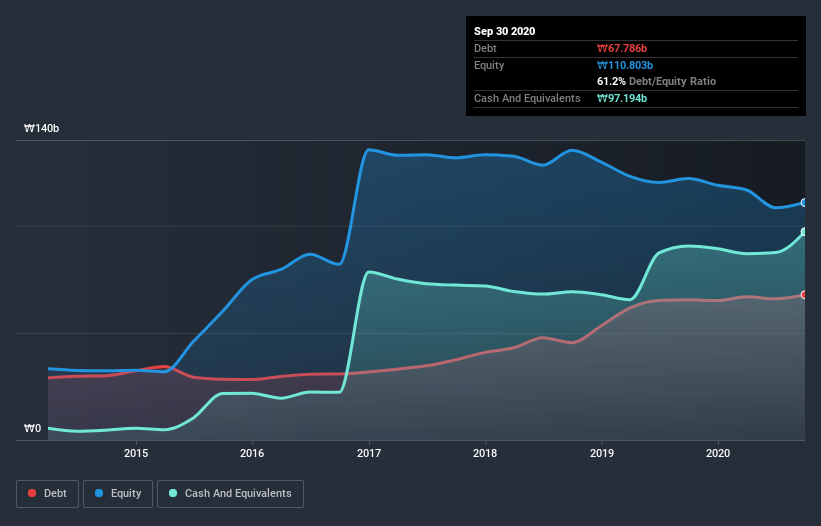- South Korea
- /
- Medical Equipment
- /
- KOSDAQ:A085370
Does Lutronic (KOSDAQ:085370) Have A Healthy Balance Sheet?

Some say volatility, rather than debt, is the best way to think about risk as an investor, but Warren Buffett famously said that 'Volatility is far from synonymous with risk.' It's only natural to consider a company's balance sheet when you examine how risky it is, since debt is often involved when a business collapses. As with many other companies Lutronic Corporation (KOSDAQ:085370) makes use of debt. But the real question is whether this debt is making the company risky.
When Is Debt A Problem?
Generally speaking, debt only becomes a real problem when a company can't easily pay it off, either by raising capital or with its own cash flow. In the worst case scenario, a company can go bankrupt if it cannot pay its creditors. While that is not too common, we often do see indebted companies permanently diluting shareholders because lenders force them to raise capital at a distressed price. Of course, plenty of companies use debt to fund growth, without any negative consequences. When we examine debt levels, we first consider both cash and debt levels, together.
View our latest analysis for Lutronic
What Is Lutronic's Debt?
As you can see below, Lutronic had ₩67.8b of debt, at September 2020, which is about the same as the year before. You can click the chart for greater detail. But it also has ₩97.2b in cash to offset that, meaning it has ₩29.4b net cash.

A Look At Lutronic's Liabilities
We can see from the most recent balance sheet that Lutronic had liabilities of ₩83.9b falling due within a year, and liabilities of ₩12.6b due beyond that. Offsetting this, it had ₩97.2b in cash and ₩18.5b in receivables that were due within 12 months. So it can boast ₩19.3b more liquid assets than total liabilities.
This short term liquidity is a sign that Lutronic could probably pay off its debt with ease, as its balance sheet is far from stretched. Simply put, the fact that Lutronic has more cash than debt is arguably a good indication that it can manage its debt safely. When analysing debt levels, the balance sheet is the obvious place to start. But it is future earnings, more than anything, that will determine Lutronic's ability to maintain a healthy balance sheet going forward. So if you're focused on the future you can check out this free report showing analyst profit forecasts.
Over 12 months, Lutronic saw its revenue hold pretty steady, and it did not report positive earnings before interest and tax. While that's not too bad, we'd prefer see growth.
So How Risky Is Lutronic?
Although Lutronic had an earnings before interest and tax (EBIT) loss over the last twelve months, it generated positive free cash flow of ₩8.1b. So taking that on face value, and considering the net cash situation, we don't think that the stock is too risky in the near term. With mediocre revenue growth in the last year, we're don't find the investment opportunity particularly compelling. There's no doubt that we learn most about debt from the balance sheet. But ultimately, every company can contain risks that exist outside of the balance sheet. For instance, we've identified 1 warning sign for Lutronic that you should be aware of.
At the end of the day, it's often better to focus on companies that are free from net debt. You can access our special list of such companies (all with a track record of profit growth). It's free.
If you decide to trade Lutronic, use the lowest-cost* platform that is rated #1 Overall by Barron’s, Interactive Brokers. Trade stocks, options, futures, forex, bonds and funds on 135 markets, all from a single integrated account. Promoted
New: AI Stock Screener & Alerts
Our new AI Stock Screener scans the market every day to uncover opportunities.
• Dividend Powerhouses (3%+ Yield)
• Undervalued Small Caps with Insider Buying
• High growth Tech and AI Companies
Or build your own from over 50 metrics.
This article by Simply Wall St is general in nature. It does not constitute a recommendation to buy or sell any stock, and does not take account of your objectives, or your financial situation. We aim to bring you long-term focused analysis driven by fundamental data. Note that our analysis may not factor in the latest price-sensitive company announcements or qualitative material. Simply Wall St has no position in any stocks mentioned.
*Interactive Brokers Rated Lowest Cost Broker by StockBrokers.com Annual Online Review 2020
Have feedback on this article? Concerned about the content? Get in touch with us directly. Alternatively, email editorial-team (at) simplywallst.com.
About KOSDAQ:A085370
Lutronic
Lutronic Corporation manufactures and sells aesthetic and medical advanced laser, and related technology worldwide.
Flawless balance sheet with reasonable growth potential.
Similar Companies
Market Insights
Community Narratives



